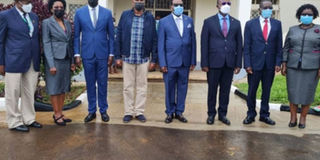Prime
Uganda threatens to exit world coffee body

In the picture are PS MAAIF Maj Gen David Kasura, Martha Wandera, Michael Nuwagaba, Hon. Tumwebaze, Dr. Charles Mugoya (Chair), Hon Fred Kyakulaga, John Nuwagaba & Connie Magomu. Photo/ Courtesy
What you need to know:
Dr Charles Mugoya, the chair of UCDA board, said ICO “use[s] the money to support their secretariat” instead of building capacity and providing support for value chain actors
Officials from the Uganda Coffee Development Authority (UCDA) have threatened to pull out of the International Coffee Organisation (ICO), saying Uganda continues to be short-changed.
Uganda and other ICO member countries annually contribute €43,000 (approximately Shs171.6m) as subscription fees.
Dr Charles Mugoya, the chair of UCDA board, said ICO “use[s] the money to support their secretariat” instead of building capacity and providing support for value chain actors.
Dr Mugoya made the remarks while speaking at a breakfast meeting yesterday about the progress of the implementation of the coffee roadmap in the wake of President Museveni assenting to the National Coffee Act.
He said the ICO is neither a coffee regulatory nor marketing body, but rather a global coffee monitoring system that does not participate in determining coffee prices.
The body brings together exporting and importing governments to tackle the challenges facing the world coffee sector through international cooperation.
“ICO only monitors the trends of coffee around the world, then the member countries use the information for their own benefit. Even if we pull out, we do not lose out,” Dr Mugoya said.
“We can still get that information from their website. We have demanded for these services, but they have not responded. We are still negotiating with them to see if they can get us what we want,” he added.
Asked about the two percent levy on coffee exports, Dr Mugoya said the tax is an internationally-recognised modality for raising revenue intended to support research in coffee production.
“Since other countries like Kenya and Tanzania do it, even at a higher level, we are also doing it. Government funding for sectors fluctuates and the easiest way to generate money for research is through this tax, but we have not yet had a conclusive percentage. It may even go below [two per cent],” he said.
Mr Robert Waggwa Nsibirwa, the president of Uganda Coffee Federation, said: “There is a need to operationalise the coffee rules and regulations which are outdated and let us (private sector) be fully engaged and consulted.”
Uganda was recently ranked third country with the best coffee globally by a group of independent specialists. This after it overtook India as the leading supplier of coffee after Italy and Brazil.
Coffee revenue
The latest UCDA statistics reveal that Uganda is producing 8 million bags of coffee per year. Elsewhere, 6.5 million bags worth $657m were exported compared to 5.22 million bags worth $502.24m in the previous year. This represents an increase of 23 percent and 21 percent in both quantity and value respectively. Consequently, the target is for Uganda to produce 20 million bags of coffee by 2025.




